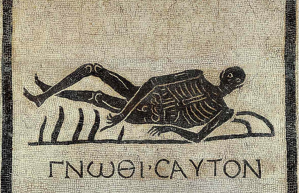New facilitation tool - self-anchoring

I was with a Year 4 class today working to the brief to do something that connects with the Greeks (specifically The Odyssey). Usually, I would simply make use of The If Odyssey, but last week the class had brought themselves to the question of what a 'true self' is, so I wondered whether there was anything else I could do that would allow this to go further.
I decided to tell the class about the Delphic Oracle and its famous inscription 'know thyself' (image above is the Ancient Greek for 'know thyself'). I started the session by asking a hermenieutical question: What do you think this might mean? They began relatively tentatively but then a discussion emerged about bullying starting from one contribution about knowing thyself meaning that you would know what to do if someone was bullying you. I began by using the anchoring technique to bring them back towards the question but the class was very motivated to discuss what to do when you're being bullied.
As a facilitator I felt that I was faced with a problem: this discussion was no longer philosophical but clearly important to them. Simply anchoring would no longer work as there was no longer any obvious logical connection between their conversation and the start question. So, instead I opted for a connection of meaning rather than logic that maintained the group's autonomy and that did not 'block' their new conversation.
I asked: 'Does this conversation have any links with the question we started with about knowing yourself?' Instantly lots of hands went up. I gave them a minute to talk to each other and went around, listening to them to see what kind of impact this question had had on them (the key way in which one evaluates an intervention: observing its impact). Many of them were making some fantastic connections! It had worked a treat.
Here's a couple of examples:
'They're connected because if you bully someone and you keep doing it then you might become a bully', and, 'It's to do with what kind of person you are', and, 'You're only a bully if you bully most of the time' (this from a girl who had never willingly contributed in philosophy in whole-group discussions).
Then we moved into a discussion about essentialism: they recognised that one can perform an action of a certain kind but they were very split on whether this meant that you would be a person of a certain kind. So, you can bully, or do something kind, but does that mean that 'you are a bully' or that 'you are a kind person'?
I think this facilitation strategy could be called 'self-anchoring'.
Posted by Peter Worley on 17th June 2016 at 12:00am
Category: P4C




